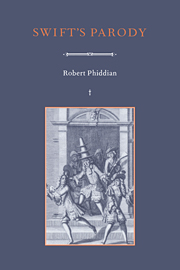Book contents
- Frontmatter
- Contents
- Acknowledgments
- List of abbreviations
- Introduction
- 1 Theoretical orientations
- 2 Restoration enterprises and their rhetorics
- 3 Parody and the play of stigma in pamphlet warfare
- 4 The problem of anarchic parody: An Argument against Abolishing Christianity
- 5 Authority and the author: the disappearing centre in Swiftian parody
- 6 Entrance to A Tale of A Tub
- 7 A Tale of A Tub as an orphaned text
- 8 A Tale of A Tub as Swift's own illegitimate issue
- Conclusion: parodic disguise and the negotiability of A Tale of A Tub
- Select bibliography
- Index
Introduction
Published online by Cambridge University Press: 29 September 2009
- Frontmatter
- Contents
- Acknowledgments
- List of abbreviations
- Introduction
- 1 Theoretical orientations
- 2 Restoration enterprises and their rhetorics
- 3 Parody and the play of stigma in pamphlet warfare
- 4 The problem of anarchic parody: An Argument against Abolishing Christianity
- 5 Authority and the author: the disappearing centre in Swiftian parody
- 6 Entrance to A Tale of A Tub
- 7 A Tale of A Tub as an orphaned text
- 8 A Tale of A Tub as Swift's own illegitimate issue
- Conclusion: parodic disguise and the negotiability of A Tale of A Tub
- Select bibliography
- Index
Summary
There is one Thing which the judicious Reader cannot but have observed, that some of those Passages in this Discourse, which appear most liable to Objection are what they call Parodies, where the Author personates the Style and Manner of other Writers, whom he has a mind to expose.
The rhetorical flow of this sentence figures the process by which attention to parody has been overwhelmed by attention to satire in the study of Swift's prose. We are all, we eagerly assume, ‘judicious Reader[s]’, and, consequently, we can convert the parodies easily and accurately into attacks on the satirical objects whom the author ‘has a mind to expose’. This assumption that parodic language is a transparent medium for the conveyance of satirical meanings has its problems, however. The history of the reception of Swiftian satire is one of disputed interpretations, and few of these disputes have been of the kind where a dialectical attrition of opinions has led gradually to a narrowing consensus. Fashions come and go, but we are no closer to agreement on whether the Houyhnhnms are paragons or monsters, whether A Tale of A Tub attacks or defends Anglican piety, or whether the Argument against Abolishing Christianity is for or against nominal Christianity. If, as A Tale's apologist seems to suggest here, parody is merely the vessel carrying satiric meaning and satire is simply and obviously punitive, then it is hard to escape the conclusion that Swift is a failure as a satirist.
- Type
- Chapter
- Information
- Swift's Parody , pp. 1 - 5Publisher: Cambridge University PressPrint publication year: 1995



